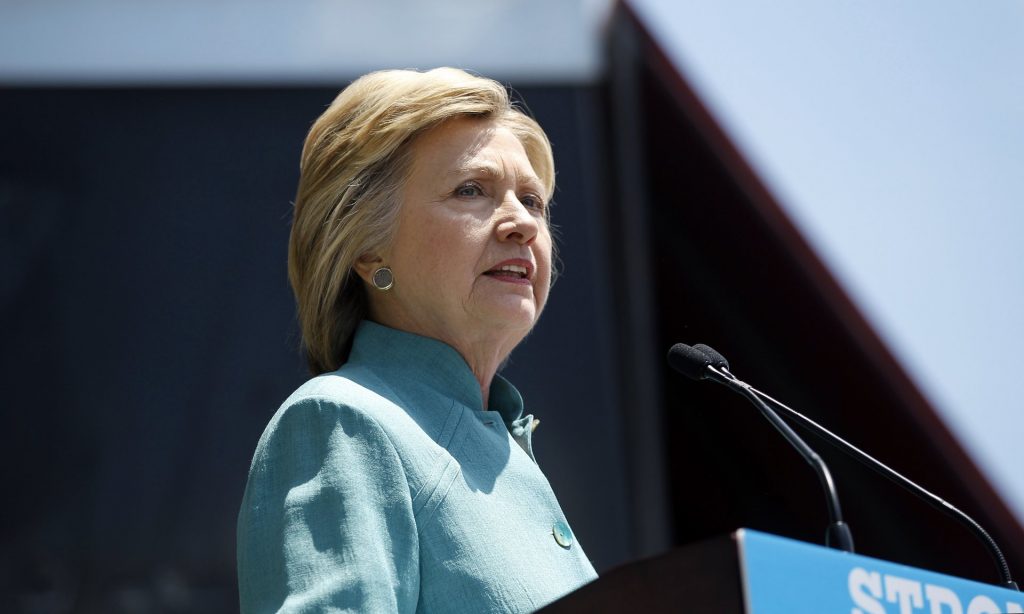
Photograph: Mel Evans/AP
Attorney general Loretta Lynch closed the investigation into Hillary Clinton’s private email practices with no charges on Wednesday, formally ending a protracted saga that has clouded her campaign with questions of trustworthiness.
“Late this afternoon, I met with FBI director James Comey and career prosecutors and agents who conducted the investigation of Secretary Hillary Clinton’s use of a personal email system during her time as secretary of state,” Lynch said in a statement.
“I received and accepted their unanimous recommendation that the thorough, yearlong investigation be closed and that no charges be brought against any individuals within the scope of the investigation.”
Lynch made an unusual public promise last week to follow the FBI’s recommendation, after a brief airport encounter with former president Bill Clinton created controversy around her independence in the investigation.
“That the meeting I had is now casting a shadow over how people will view that work is something that I take seriously and deeply and painfully,” she said at the press conference.
“The recommendations will be reviewed by career supervisors in the Department of Justice and in the FBI, and by the FBI director. And then as is the common process, they present it to me and I fully expect to accept their recommendations.”
Lynch called the conversation “social”, and said it touched on grandchildren, travel and golf.
On Tuesday, Comey upbraided Clinton and her staff with a lengthy and scathing description of what agents had found on her private email servers. He called their practices “extremely careless”, but said that agents could not find evidence of intentional wrongdoing, obstruction of justice or “vast quantities” of data breached.
“Although there is evidence of potential violations of the statutes,” he said, “our judgment is that no reasonable prosecutor would bring such a case.”
Comey and prosecutors with the agency recommended no charges to the justice department, but their investigation undermined or disproved many of Clinton’s defenses about her practices, including her July claim: “I never received nor sent any material that was marked classified.”
Of the 30,000 emails given by Clinton to the state department, Comey said, 110 emails in 52 chains contained classified information at the time they were sent. Eight were considered “top secret”, and although the FBI found no evidence of a hacking breach, Comey said, “It is possible that hostile actors gained access.”
“We are pleased that the career officials handling this case have determined that no further action by the department is appropriate,” Clinton’s campaign spokesman Brian Fallon in a statement after Comey’s briefing.
“As the secretary has long said, it was a mistake to use her personal email and she would not do it again. We are glad that this matter is now resolved,” he added.
Clinton’s opponent in the 2016 presidential election, Republican Donald Trump, has insinuated that Lynch and the FBI were inappropriately influenced by the former president and Barack Obama, who has endorsed his former secretary of state.
“As FBI director James Comey let Clinton off the hook for her ‘extremely careless’ actions, the fix was final,” Trump said in a statement Tuesday. “The Obama administration’s anointed successor has had an indictment removed from her path, and will now be able to glide to the rigged Democrat nomination.”
Last week he tweeted: “Take a look at what happened [with] Bill Clinton. The system is totally rigged. Does anybody really believe that meeting was just a coincidence?”
The highest ranking Republican in Washington, House Speaker Paul Ryan, said on Tuesday night that Comey, himself a Republican, will be called to testify before Congress about the investigation.
“We’re going to have hearings,” Ryan told Fox News, suggesting the emails would remain a topic of discussion for weeks. “There are a lot of unanswered questions here.”

